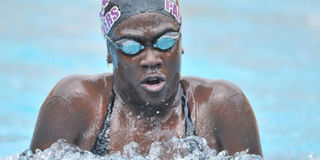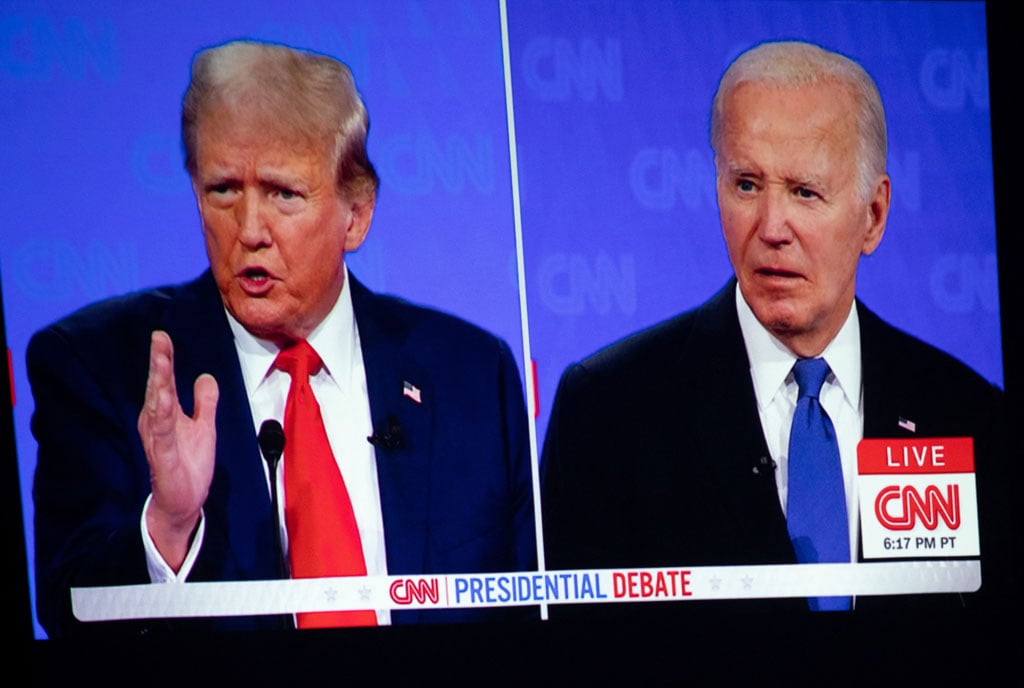Prime
Ugandan swimming toils to keep head above water

Uganda female swimmer Lunkuse
There was, as Brooke Fraser crooned not so far back, something in the water after the typically azure pool water at the Maria Lenk Aquatics Centre turned swampy green, leaving divers at the Rio Olympics part stunned and part thrilled this past week. That something? High alkaline levels.
Elsewhere in Rio’s Aquatic Centre, the water that swimmers’ well-toned bodies tore through did not quite strain under the weight of a subtle pH tweak. The water was as blue as a cloudless sky, and it provided a platform for the most decorated Olympian of all time to achieve victories few thought possible.
Not that Michael Phelps arrived at Rio 2016 as an outsider, but he no longer had the world at his size 14 feet. Well, at least that is what many thought after he placed second in his signature event -- the 200 metres butterfly -- at London 2012, and failed to podium at the 2014 US Championships. A drink problem that forced him to check into rehab drilled more chinks in his armour.
Coming out of retirement to compete at Rio 2016 was a brave call by Phelps especially since he was thought to have lost some of his specificity and power. He gave little or no fodder to his critics after coming up with some profound performances, the pick of which was regaining gold - his 21st - in the 200 metres butterfly.
Positive tests
That’s not to say that it was all rosy, that swimming at Rio 2016 was not held in a thunderously dark embrace. There was lots of finger pointing done outside the pool.
Taking gold in the women’s 100 metres breaststroke final did not stop American Lilly King from calling into question Russia’s Yulia Efimova’s place at the Olympics.
Efimova was controversially reinstated to the competition after a second positive test had earlier earned her a red flag. There were more drug-related recriminations after China’s Sun Yang took gold in the 200 metres freestyle against the backdrop of accusations of being a drug cheat.
Though the tone was not as loud, certainly as intense, as the drug-related recriminations, concerns were voiced about the so-called universality rule championed by world swimming governing body, Fina. The rule is supposed to be a feather in Fina’s cap because it shows a commitment to develop the sport around the world including swimming backwaters. It essentially extends two wild cards to countries without ‘A’ standard swimmers to compete at major global championships.
It’s down to such wild cards that Uganda managed to field Joshua Ekirikubinza in the splash-and-dash as well as Jamila Lunkuse in the 100 metres breaststroke at Rio 2016. Both failed to clear the first hurdle. Ekirikubinza placed 64th out of 85 after completing his 50 metres freestyle heat in 25.98 seconds.
Lunkuse clocked 1:19.64 to bring up the rear in her heat en route to finishing 40th out of 44. Contrary to word doing the rounds from armchair observers, the two swimmers merited their places at Rio 2016 (unlike during Athens 2004 when Edgar Luberenga was fielded).
Well, at least according to the universality rule. The same cannot be said about other countries (although Uganda Swimming Federation should not be in a hurry to bask in glory especially after it sent its executive member and coach Max Kanyerezi to Rio, overlooking more competent coaches like Muzafaru Muwanguzi and Tony Kasujja, who worked with Lunkuse and Ekirikubinza at age-grade level). Kenya, for instance, left out its two best swimmers -- Becky Kamau and Issa Mohamed -- in what can only be described as mysterious circumstances.
Case of wildcards
Over in Ethiopia, Robel Habte is alleged to have gotten a wild card to compete in the 100 metres freestyle because he is the son of the president of his native country’s swimming federation.
Habte, whose paunch precipitated distasteful comparisons with a whale after he came last in his 100 metres freestyle heat, has tried not to go down without a fight. Regardless, Habte’s tale has shades of Eric Moussambani who was christened ‘the eel’ at Sydney 2000 after completing his 50 metres freestyle race in an embarrassingly slow time of 1:52.72.
Going forward, Fina will need to rethink and also probably heavily police its universality places to ensure that wild card picks are of merit. It will also have to seriously consider investing in erecting swimming infrastructure in some, if not all, of the swimming backwaters dotting the globe. Uganda, for one, does not have a single Olympic pool in its confines.
How then would you expect it to make a splash at global championships like the Olympics?
Boxing in Uganda proves not to be the Rio deal
The symbolism of the picture of Kennedy Katende on his knees after succumbing to a blur of punches from Britain’s Joshua Buatsi, and soon to concede a TKO (technical knockout), was richness personified.
It captured anything and everything - the sense of hopelessness, how the Ugandan light heavy was out of his depth, name it!
The British tabloid, Daily Mail, was ruthless in its postmortem of the lopsided bout, describing Katende as ‘the most unfit athlete at the Games’, and his belly ‘rotund’.
A message that the Swedish-based boxer posted on Facebook predictably made no mention of the bout. Basheer Abdullah, a boxing coach who put Katende through his paces during the now two-time Olympian’s sojourn in the United States, revealed that his former pupil blamed the embarrassing defeat on, wait for it, being ‘overtrained’. Abdullah added that pushing the envelope left Katende jaded to the point that he felt he ‘was lacking energy’.
Questions will now be asked of Uganda Boxing Federation (UBF) especially how Sam Rukundo got the coaching gig for Uganda’s two-strong boxing team at Rio 2016.
Ronald Serugo, the other Ugandan boxer at the Games of the 31st Olympiad, squared off against Armenia’s Narek Abgaryan yesterday with Rukundo executing the cornerman duties. When Rukundo was named coach of Katende and Serugo, there were doubts as to whether his tactics would be transferable at all.
Rukundo is best known for a Cinderella run at Athens 2004 that left him on the cusp of a great achievement. An unknown quantity in a Bombers team that included acclaimed names like Joseph Lubega and Jolly Katongole, Rukundo was one fight away from podiuming at the Games of the 28th Olympiad.
Rukundo’s credentials
With little detail about Rukundo’s coaching experience at their disposal, there was a palpable fear among Ugandan boxing enthusiasts that, going into Rio 2016, the Bombers were at the vanguard of an ominous shift.
Kenneth Gimugu, UBF’s highest ranking official, was cocksure that the big assignment suited Rukundo’s talents perfectly. This did not hush claims that the Swedish-based coach had little or nothing in his toolbox to take the Bombers places. Revelations that he could have compromised Katende’s style considerably will only make a bad situation worse.
Having delivered four of Uganda’s seven medals, boxing is doubtless Uganda’s most successful Olympic sport. Cat fights in the boardroom brought with them lots of reputational damage for the sport.
With the last of its four medals having come at Moscow 1980 courtesy of John Mugabi, the sport has taken on the status of a sleeping giant. It is highly unlikely to be awakened in Rio de Janeiro.
In fact, Rio 2016 has provided a new low because, despite being only fitfully impressive in the past, Ugandan boxers at different Olympiads have quintessentially been supremely fit.
They always put up spectacular fights, and rarely exit with the sort of whimper that Katende put up.
What we know
We know that athletics got onto Rio 2016’s menu on Friday. The highlight that is the men’s 100-metre dash final comes for viewing in the early hours of Monday morning.
By the time your read this, you will already know whether Shelly-Ann Fraser-Pryce has become the first person to win three straight Olympic 100m titles.
The ‘Pocket Rocket’ went into the Games in a slightly vulnerable position with her main foes Dafne Schippers and Tori Bowie in tremendous form.
We, however, know that a combination of injuries and loss of form has denied us what would have been great showdowns in other races.
Placed fourth
We know for sure that Allyson Felix will not defend her 200 metres Olympic title after she came fourth at the US trials.
The possibility of Felix coming up against Schippers had whetted the appetite of many track and field enthusiasts.
We know that Felix will have a crack at the 400 metres title, but she will not come up against the defending champion Sanya Richards-Ross who pulled up injured during the US trials.
The US trials also denied us what would have been an absorbing battle between new 100 metres hurdles record holder Kendra Harrison and Brianna Rollins.
Harrison is not at Rio 2016 after her form deserted her at the US trials.




